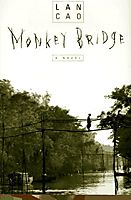Synopsis, courtesy of Amazon.com:
 Hailed by critics and writers as powerful, important fiction, Monkey Bridge charts the unmapped territory of the Vietnamese American experience in the aftermath of war. Like navigating a monkey bridge–a bridge, built of spindly bamboo, used by peasants for centuries–the narrative traverses perilously between worlds past and present, East and West, in telling two interlocking stories: one, the Vietnamese version of the classic immigrant experience in America, told by a young girl; and the second, a dark tale of betrayal, political intrigue, family secrets, and revenge–her mother’s tale. The haunting and beautiful terrain of Monkey Bridge is the “luminous motion,” as it is called in Vietnamese myth and legend, between generations, encompassing Vietnamese lore, history, and dreams of the past as well as of the future. “With incredible lightness, balance and elegance,” writes Isabel Allende, “[Lan Cao crosses] over an abyss of pain, loss, separation and exile, connecting on one level the opposite realities of Vietnam and North America, and on a deeper level the realities of the material world and the world of the spirits.”
Hailed by critics and writers as powerful, important fiction, Monkey Bridge charts the unmapped territory of the Vietnamese American experience in the aftermath of war. Like navigating a monkey bridge–a bridge, built of spindly bamboo, used by peasants for centuries–the narrative traverses perilously between worlds past and present, East and West, in telling two interlocking stories: one, the Vietnamese version of the classic immigrant experience in America, told by a young girl; and the second, a dark tale of betrayal, political intrigue, family secrets, and revenge–her mother’s tale. The haunting and beautiful terrain of Monkey Bridge is the “luminous motion,” as it is called in Vietnamese myth and legend, between generations, encompassing Vietnamese lore, history, and dreams of the past as well as of the future. “With incredible lightness, balance and elegance,” writes Isabel Allende, “[Lan Cao crosses] over an abyss of pain, loss, separation and exile, connecting on one level the opposite realities of Vietnam and North America, and on a deeper level the realities of the material world and the world of the spirits.”
Monkey Bridge is the story of Mai and Thanh, recent immigrants to America from Vietnam. Through the kindness of Uncle Michael, an American GI and family friend, Mai was able to leave before the fall of Saigon; her mother, Thanh, followed through the American airlift shortly after. The novel highlights the struggle for Mai and her mother to assimilate in America. For Mai, the struggle is not too difficult. Within a few months, she has learned to appreciate America’s shopping malls, has gotten used to the chill of Virginia, and speaks American English without a Vietnamese accent. For Thanh, the adjustment is more challenging. In Vietnam, Thanh’s French convent school education gave her fluency in French and a love for the French classics. In America, she is just another immigrant who spoke no English.
In their effort to assimilate, Mai and her mother have ignored the riddle that continues to prey on their minds: on the day that her mother was airlifted out of Saigon, Mai’s grandfather, Baba Quan, was left behind. Mai is confused by her mother’s alternating grief for and seeming indifference to Baba Quan. When Thanh suffers a stroke, Mai hears her call out for Baba Quan. This incident sparks Mai’s resolve to find her grandfather, because she believes Baba Quan is the only person who can ease Thanh’s disquiet.
Lan Cao has clearly written an autobiographical novel. In the book’s jacket, the author is described as having left Vietnam in 1975. The photo, naturally, is the requisite black and white. Lan Cao is wearing black, standing against a stark background with her arms folded, unsmiling. Clearly, this is a very serious book about a very serious subject from a very serious writer.
Lan Cao, however, cannot quite reach her ambition. That’s not to say that “Monkey Bridge” is altogether bad. The descriptions of Little Saigon will ring true for any immigrant who has tried to find a familiar enclave in their adoptive country. Mrs. Bay, Thanh’s best friend, is touching in her zeal; she is so grateful to be given a fresh start that she maintains a cheerful disposition each day, despite her fears for Vietnam. Compared to the flatness of Thanh and Mai, Mrs. Bay is full of life, and it is the passages where she was included that I read with the most enjoyment.
Unfortunately, Monkey Bridge is so clearly autobiographical that the author muddles the narrative. The story itself is interesting, but its execution is ungainly and full of amateur touches. The ending felt cheap and shoddy, complete with maudlin melodrama and a big reveal that came out of nowhere like a bat out of hell. What makes Monkey Bridge so disappointing is that the author was unable to mold such rich, raw experience into something great. Mai had this to say about her mother, Thanh, and it sums up my discontent with this novel:
We were both in the space where all things linger, only to turn unpredictably with the exquisite swiftness of a hard flower. We all enter this space when we wait – for motionless shadows to shift with a moment’s notice, and hopes to become possibilities.
Like Mai, I too held my breath, waiting for the author to spin a tale that would captivate. Sadly, Lan Cao did not deliver because she was unsure whether she wanted to write a novel or a memoir; in the end, Monkey Bridge succeeds as neither.

